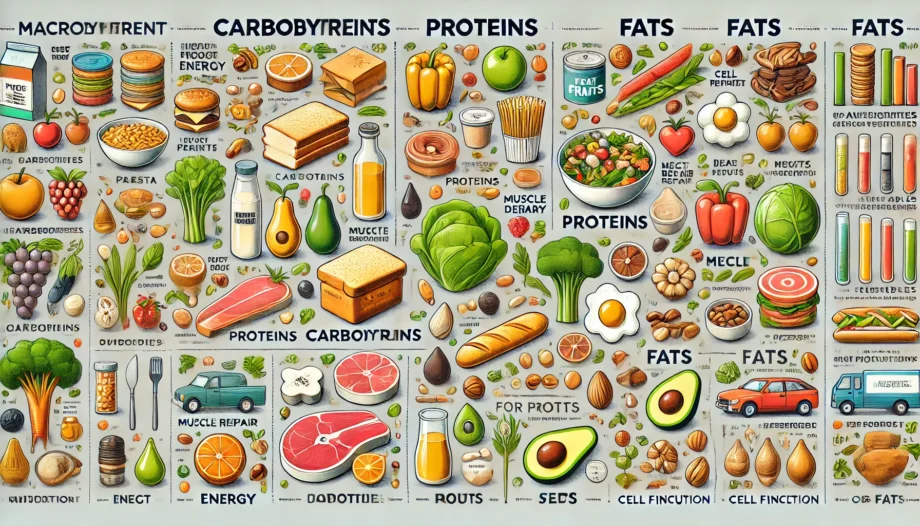When it comes to achieving your fitness goals and maintaining a healthy lifestyle, understanding macronutrients is key. But what are macronutrients and why are they important? In this article, we’ll dive deep into the world of macronutrients, breaking down their significance, sources, and how they can help you on your journey to a better body.
What Are Macronutrients?
Macronutrients, often referred to as macros, are the nutrients that our bodies need in large amounts to function correctly. These include carbohydrates, proteins, and fats. Each macronutrient plays a crucial role in our health and wellbeing.
Carbohydrates
Carbohydrates are the body’s main source of energy. They are found in foods like bread, pasta, fruits, and vegetables. When you consume carbs, your body breaks them down into glucose, which is used for energy or stored for later use.
Why Are Carbohydrates Important?
- Energy Production: Carbs are the preferred energy source for your brain and muscles.
- Digestion and Metabolism: Fiber, a type of carbohydrate, aids in digestion and helps regulate blood sugar levels.
- Performance and Recovery: For athletes and active individuals, carbs are vital for optimal performance and quick recovery.
Proteins
Proteins are the building blocks of your body. They are composed of amino acids, which are essential for muscle repair, immune function, and the production of enzymes and hormones. Protein sources include meat, dairy, beans, and nuts.
Why Is Protein Important?
- Muscle Repair and Growth: Protein is essential for repairing and building muscle tissue, especially after exercise.
- Immune Function: Proteins help produce antibodies that fight off infections.
- Hormone Production: Proteins are involved in creating hormones that regulate various bodily functions.
Fats
Fats often get a bad rap, but they are essential for overall health. They provide long-term energy, support cell growth, and protect your organs. Healthy fats can be found in avocados, nuts, seeds, and fish.
Why Are Fats Important?
- Energy Storage: Fats provide a concentrated energy source and help you feel full longer.
- Cell Function: Fats are crucial for maintaining healthy cell membranes.
- Nutrient Absorption: Certain vitamins (A, D, E, K) are fat-soluble, meaning they need fat to be absorbed properly.
Balancing Your Macronutrients
Now that we know what macronutrients are and why they are important, the next step is learning how to balance them. The right macronutrient ratio depends on your individual goals, activity level, and body type. Here are some general guidelines:
- For Weight Loss: A higher protein and lower carb approach can help with satiety and muscle preservation.
- For Muscle Gain: Increasing protein and carbs can support muscle growth and recovery.
- For Maintenance: A balanced intake of all three macronutrients can help maintain current body composition and overall health.
How to Track Your Macros
Tracking your macronutrients can be a game-changer in reaching your health and fitness goals. Here are some tips to get started:
- Use a Tracking App: Apps like MyFitnessPal or Cronometer can help you log your food intake and keep track of your macros.
- Read Food Labels: Understanding the nutritional information on food labels can help you make better choices.
- Plan Your Meals: Preparing meals in advance ensures you meet your macronutrient targets consistently.
Common Questions About Macronutrients
Q: Can I eat carbs if I want to lose weight? A: Yes, you can! It’s about finding the right balance and choosing complex carbs like whole grains and vegetables over simple sugars.
Q: How much protein do I need? A: This depends on your activity level and goals. A general recommendation is 0.8 grams of protein per kilogram of body weight, but this can increase if you’re very active or aiming to build muscle.
Q: Are all fats bad for me? A: Not at all. Focus on consuming healthy fats from sources like avocados, nuts, and fish, and limit your intake of trans fats and saturated fats.
Conclusion
Understanding what macronutrients are and why they are important is crucial for anyone looking to improve their health and fitness. By ensuring you get the right balance of carbohydrates, proteins, and fats, you can fuel your body effectively, achieve your fitness goals, and maintain overall well-being. So, start paying attention to your macros and see the difference it can make in your life!

